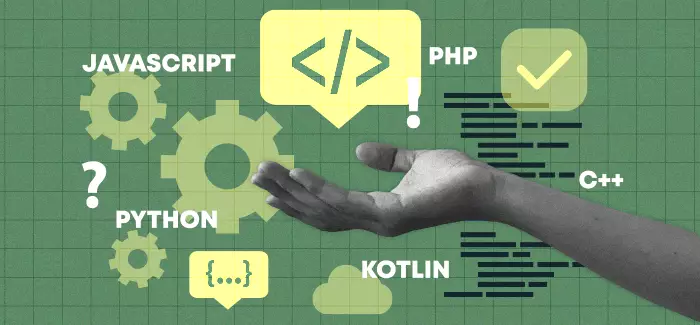Articles > Information TechnologyÌı>ÌıWhat is the best programming language to learn?Ìı
What is the best programming language to learn?
This article was updated on June 14, 2024.

Written by Michael Feder

Reviewed byÌıKathryn Uhles, MIS, MSP,ÌıDean, College of Business and IT

Computer programmingÌırelies on different programming languages. There are dozens, but all have the same goal: to provide aÌıframework in which a program can operate. While that goal is the same, the primary features differ among programming languages. Some are better forÌıorganizing and visualizing data, while others are preferable forÌıcreating user interfaces. Although some coding systems are easier to learn than others, none are inherently better or worse. Which one might be the best to learn?
Which is the best programming language to learn first?Ìı
Depending on the career path, the best programming language to learn first might be one of the easiest and most common ones.
Note that it is common to use the term âprogrammingâ for both scripting and programming languages. In this article, the term âprogramming languageâ refers to both.
That said, here are a few of the most common programming languages to start with:
JavaScript: JavaScript is a popular front-end programming language thatâs typically considered a general-purpose coding system. It allows developers to add dynamic andÌıinteractive elementsÌıto websites.
HTML/CSS: HyperText Markup Language (HTML) and Cascading Style Sheets (CSS) are two related coding systems that control theÌıuser-facingÌı(front-end) aspects of websites. HTML provides a general framework for web development, while CSS handles formatting and layout.Ìı
C, C# and C++: For many computer science and IT students, back-end coding education starts with C. It is aÌıbecause of itsÌısimplicity and flexibility.
PHP: This language was used to create , making it a popular choice for web developers.
Is it necessary to learn several programming languages?Ìı
There areÌıprofessional programmers, software developers and other IT pros whoÌılearn multiple programming languages, although the ones they learn depend on what they do at their jobs and their level of expertise. Those who plan on a career in a computer or IT field will want to learn the ones that are most useful for theÌıspecialization they plan to pursue before deciding which is the best programming language to learn.
Many programming languages are meant for specific applications, so the choice may be obvious. However, the distinction betweenÌıfront-end and back-end languagesÌıis the most useful for computer science students.
- Front-end languages focus onÌıinteractivity and user experience. Developers use these programming languages, such as JavaScript and HTML, to create interfaces that users rely on to navigate software, applications or websites. Front-end coding deals with design, appearance, user controls and related features.
- Back-end coding systems are client-facing and deal with data, servers, algorithms and overall functionality. C++, Java and Python are popular back-end coding systems. Back-end languages can affect software or site functionality but donât directly involve the user interface.Ìı
Some professionals choose to learn both front-endÌıandÌıback-end programming languages. These multidisciplinary specialists are known asÌıfull-stack developers. They can handle both user and client-facing programming tasks and may enjoy employment options that reflect this versatility.
What programming language is most in demand?Ìı
Knowing which are most popular for different purposes can help determine the best programming language to learn in order to add to a skill set. Here are some of the , although itâs worth noting these can change as technology and the industry evolve:
- Python: Since it works on different systems and browsers, Python is the language of choice for many development projects. In addition to being the most popular language for software development, Python has special applications in finance and machine learning.
- Java: Different from JavaScript, Java is a server-side language. According to the Popularity of Programming Language (PYPL) Index, Ìı(after Python) because of its platform independence.
- Go: Golang (Go for short) is growing in popularity, especially among web developers. ÌıthatâsÌıeasy to learn.
- SQL: Structured Query LanguageÌı focuses on managing information housed in databases. Those who work with data may find it necessary to know this language.Ìı
- R: R is an important language for data analytics. Itâs necessary for anyone studying for a data science degree. It focuses onÌıstatistical calculationsÌıandÌıvisualization.Ìı
The best programming language to learn by use caseÌı
Different computer science applications and functions require knowledge of various programming languages.After deciding which area to focus on, whether itâs software development or cybersecurity, the following are some of the most important languages to know.Ìı
CybersecurityÌı
Knowing how to code is essential for many tasks in this area of computer science, including penetration testing, forensic analysis, response and containment, and cybersecurity software development. Top languages to know include:
- Python. Thanks to wide availability of libraries and frameworks, cybersecurity professionals use this language for several functions, including network scanning and vulnerability analysis.
- HTML. Many to design and carry out their attacks. To protect against malicious HTML injection, data theft and website defacement, security professionals should conduct security audits and implement a Content Security Policy (CSP). Input validation and sanitation is highly recommended to clean, remove and block malicious and potentially malicious inputs.Ìı
- C and C++. These provide cybersecurity professionals with control over system resources and can be used to create highly secure code.
- SQL. Cybercriminals often use , so cybersecurity professionals frequently work to master this language in order to prevent attacks.
App developmentÌı
What is the best programming language to learn for app development? These are some of the most commonly used:
- JavaScript: Its extensive ecosystem of resources, community support and overall flexibility make this a top choice for app developers.
- Java: Itâs been one of the primary languages for Android apps since the platform was developed.
- Swift: This is the main programming language for iOS apps.
- Python: The languageâs ease of use makes Python a popular choice for app development.
Web developmentÌı
For a career developing websites and web apps, learn one or more of the following.
- Python: Frameworks like Django and Flask make building web applications fast and efficient.
- PHP: As mentioned, PHP is by far the most often used language for website development. Itâs also easy to integrate with various types of databases. Ìı
- Ruby on Rails: Since itâs easy to use, Ruby enhances developer productivity. It also has an ample set of libraries to simplify development.
- JavaScript: While itâs mainly a client-side language, JavaScript can also be used for creating interactive webpages.Ìı
Back-end developmentÌı
- C#: This language is common in enterprise environments.
- Go. Itâs especially popular for back-end development in high-performance applications and cloud services.
- Java. This language is used for creating large web applications that require keeping data safe.
Full-stack developmentÌı
Some languages are useful for both front- and back-end development, which streamlines and simplifies the entire process. These include:
- JavaScript: In addition to being used for webpages, JavaScriptâs Node.js runtime environment means it can be used on the server side.
- Java: While traditionally used for the back-end, it can be integrated with front-end technologies.
- PHP: PHP can generate dynamic HTML and is also often used for powering content management systems.
While itâs not necessary to learn all of these, the more languages someone knows, the more theirÌıcomputer science skills will be enhanced, and the more flexibility they will have in their career.
What is the most useful programming language to learn?Ìı
Thereâs no one definitive answer about the best programming language to learn. It depends onÌıwhich careers in computer science sound most attractive. Answering that questions can help decide which languages to spend time and energy on learning.
Exploring technology degree programs can also as a guide. Programs in data science, software development and cybersecurity may emphasize different programming languages.
Remember that technology environments and expectations change frequently, and new programming languages are continually being developed. A career in computer science requires a commitment to lifelong learning. Fortunately, there are plenty of resources to help learn new programming languages and expand professional abilities â and professional options.
What is the best programming language to learn for a technology degree?
If you are interested in a career in information technology, knowing which degree you want to pursue can help you decide the best programming language to learn.
Aspiring application developers, for example, may pursue a Bachelor of Science in Computer Science, while a Bachelor of Science in Cybersecurity will cover scripting languages from a different perspective.
Additional degree programs that include programming languages are Bachelor of Science in Data Science and Bachelor of Science in Information Technology.
Meanwhile,Ìıadvanced developer certificatesÌıoften deal with topics like choosing the correct coding languages and framework for a given project. If these concepts excite you, consider earning aÌıScripted and Compiled Programming Languages Certificate (Undergraduate)Ìıat UOPX.

J.L. Graff, MBA
Associate Dean, College of Business and Information Technology, °®¶¹´«Ã½
âLearning a new programming language can take a couple of months or about a year depending on your experience and the complexity of the programming language. It is recommended to learn at least three programming languages, but the projects you work on will determine what programming languages you will need to learn and when.â
To find how why learning to code is important, watch this YouTube Video, .Ìı

ABOUT THE AUTHOR
A graduate of Johns Hopkins University and its Writing Seminars program and winner of the Stephen A. Dixon Literary Prize, Michael Feder brings an eye for detail and a passion for research to every article he writes. His academic and professional background includes experience in marketing, content development, script writing and SEO. Today, he works as a multimedia specialist at °®¶¹´«Ã½ where he covers a variety of topics ranging from healthcare to IT.

ABOUT THE REVIEWER
Currently Dean of the College of Business and Information Technology,ÌıKathryn Uhles has served °®¶¹´«Ã½ in a variety of roles since 2006. Prior to joining °®¶¹´«Ã½, Kathryn taught fifth grade to underprivileged youth in Phoenix.
This article has been vetted by °®¶¹´«Ã½'s editorial advisory committee.Ìı
Read more about our editorial process.


Get your free IT Program Guide
Learn how 100% of our IT degree and certificate programs align with career-relevant skills.
Thank you
Download your pdf guide now. Or access the link in our email.



